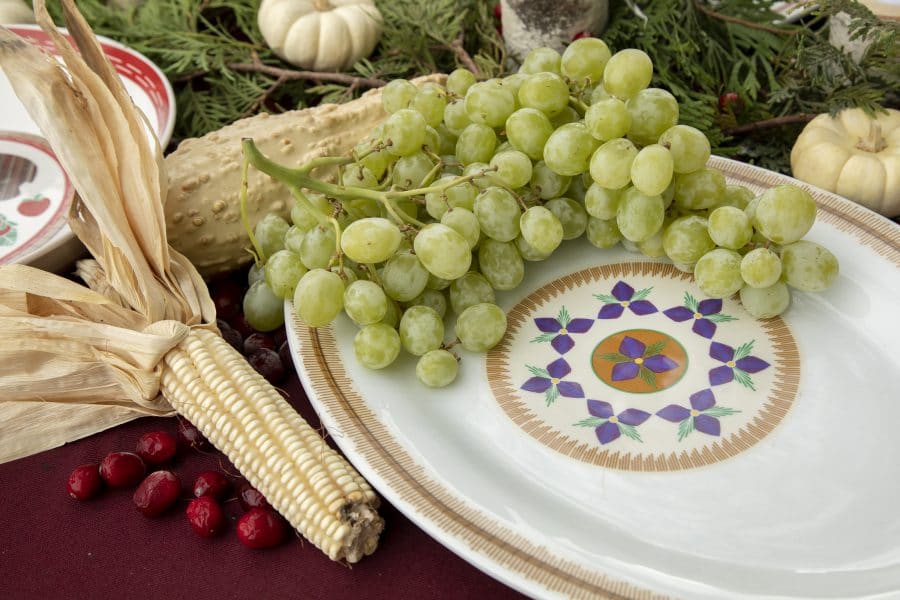Many opportunities to participate in Potawatomi culture and heritage exist in daily life, special occasions, holidays and more. Nishnabé revere their ancestors, and ceremonies help honor Potawatomi from the past. Traditional spirit plates remember those who came before. However, like any ceremony, the practices vary, and individual families and communities may have different approaches.
“Food is a precious commodity. It keeps it all relevant for us, and in today’s society, we can sometimes take that for granted,” said Justin Neely, Citizen Potawatomi Nation director of language. “In the past, food was very special, especially during wintertime when food was sparse. Taking a little bit of your food and putting it aside, it helps you remember that you’re part of something much bigger and that there’s a connection.”

During special meals or feasts, one Potawatomi tradition that honors ancestors includes setting aside small portions from each prepared dish and placing it on a plate or on a piece of birch bark.
“With a spirit plate, you are feeding your ancestors; you are feeding those who have passed on,” Neely explained.
After plating the food, some will offer séma (tobacco), and then set it into a fire or safely outside.
“If you’re going to put it out somewhere, don’t put it where there is a lot of traffic,” Neely said. “They say to never put your tobacco down somewhere that somebody is going to walk over it, if you can help it.”
In certain communities, maple water is also used. While making a spirit plate can occur during any time of the year, traditionally, Potawatomi believe the spirits sleep during winter.
“It doesn’t have to be elaborate, and it can just be something that is part of the meal,” Neely said. “Perhaps you’ve made a nice meal and maybe you make an extra dish that your grandma or grandpa liked, and you put that on a plate for them.”
While many prepare a spirit plate within specific periods after a loved one has passed, other instances spur Nishnabé to honor their ancestors as well.
“We’ve always paid a lot of attention to our dreams. They say if you dream about somebody that’s passed on, it’s an indicator that maybe you should make a spirit plate for them and that they are hungry,” he said.
Potawatomi respect food at all times, but during ceremony, Nishnabé people incorporate additional mindfulness.
“We treat it differently than a buffet,” Neely explained. “You only take a little bit of each because if it is ceremony, you are expected to eat everything on the plate. You want to make sure you eat everything and don’t waste.”
Jibakwe
A jibakwe (ghost supper) is another way Nishnabé show ancestral reverence, usually a year after the individual’s passing, but this ceremony can also occur as part of the funeral or memorial service. Regardless of time of year, sharing dinner together serves as the central focus.
“Maybe they loved liver and onions, so they’d prepare liver and onions as part of that meal. And as part of that ceremony, a lot of times people will make a spirit plate,” Neely said.
Many Nishnabé communities use a jibakwe to recognize those who take on the duties of the individual who passed away.
“As part of a jibakwe, or ghost supper, they can have a seat prepared where the person would have been if they were alive. They might even put a dish there and a blanket,” he said. “Sometimes people will … invite that person to take on that role in their family as their mother or their grandmother. They’ll give them gifts and let them stand in, if you will, for that person, both in that moment but also maybe further on.”
Being mindful of directions is another tradition incorporated by many. For example, entering and leaving from different doors.
“They say that so the spirit doesn’t follow you back in,” he added.
One Potawatomi word for ancestor — yankobjegen — translates to “tying together” and helps symbolize the deeply rooted respect Nishnabé hold for the wisdom, direction and sacrifices of the generations that came before that allow the Potawatomi to thrive today.
“Because you’re tying people together across the generations, and even the way we live our lives, everything we do, every big decision we make, we think about how it’s going to affect the next seven generations but also how it’s going to honor and respect the seven previous generations,” Neely said. “It shows that it isn’t as simple as the here and now. You have to think about the past and remember the past while moving forward at the same time.”
